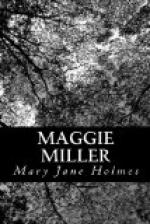CHAPTER I.
The old house by the mill.
’Mid the New England hills, and beneath the shadow of their dim old woods, is a running brook whose deep waters were not always as merry and frolicsome as now; for years before our story opens, pent up and impeded in their course, they dashed angrily against their prison walls, and turned the creaking wheel of an old sawmill with a sullen, rebellious roar. The mill has gone to decay, and the sturdy men who fed it with the giant oaks of the forest are sleeping quietly in the village graveyard. The waters of the mill-pond, too, relieved from their confinement, leap gayly over the ruined dam, tossing for a moment in wanton glee their locks of snow-white foam, and then flowing on, half fearfully as it were, through the deep gorge overhung with the hemlock and the pine, where the shadows of twilight ever lie, and where the rocks frown gloomily down upon the stream below, which, emerging from the darkness, loses itself at last in the waters of the gracefully winding Chicopee, and leaves far behind the moss-covered walls of what is familiarly known as the “Old House by the Mill.”
’Tis a huge, old-fashioned building, distant nearly a mile from the public highway, and surrounded so thickly by forest trees that the bright sunlight, dancing merrily midst the rustling leaves above, falls but seldom on the time-stained walls of dark gray stone, where the damp and dews of more than a century have fallen, and where now the green moss clings with a loving grasp, as if ’twere its rightful resting-place. When the thunders of the Revolution shook the hills of the Bay State, and the royal banner floated in the evening breeze, the house was owned by an old Englishman who, loyal to his king and country, denounced as rebels the followers of Washington. Against these, however, he would not raise his hand, for among them were many long-tried friends who had gathered with him around the festal board; so he chose the only remaining alternative, and went back to his native country, cherishing the hope that he should one day return to the home he loved so well, and listen again to the musical flow of the brook, which could be distinctly heard from the door of the mansion. But his wish was vain, for when at last America was free and the British troops recalled, he slept beneath the sod of England, and the old house was for many years deserted. The Englishman had been greatly beloved, and his property was unmolested, while the weeds and grass grew tall and rank in the garden beds, and the birds of heaven built their nests beneath the projecting roof or held a holiday in the gloomy, silent rooms.




